

Financial regulation overhaul: Same tired arguments - latimes.co. Banks Should Welcome Rules - Room for Debate. There is nothing costlier to banks than causing financial regulation to fail.
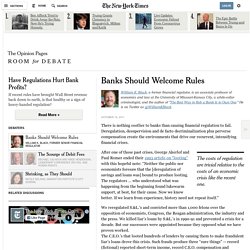
Deregulation, desupervision and de facto decriminalization plus perverse compensation create the environments that drive our recurrent, intensifying financial crises. The costs of regulation are trivial relative to the costs of an economic crisis like the recent one. Leverage, Maturity Transformation and Financial Stability. Acemoglu and Robinson: Why Nations Fail. Why Nations Fail I would tend to add to what Robinson has to say that extractive economic institutions tend to actively promote and fund extractive political movements, laws, public policy, and systems of both the left and the right.
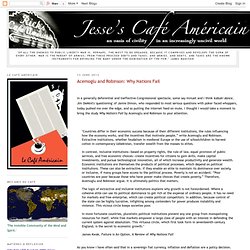
Even the subversion of effective government and a descent into near anarchy can serve the monied interests, because effective democratic government is a counterbalance against private power. The fallacy of financial regulation: neglect of the shadow banking system.
Brown-Vitter. To Volcker Rule. Crisis Prevention. Creating and Implementing an Enforcement Response to the Foreclosure Crisis. Governor Sarah Bloom Raskin At the Association of American Law Schools Annual Meeting, Washington, D.C.
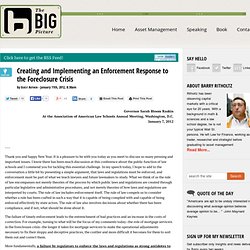
January 7, 2012 Thank you and happy New Year. How Wall Street Killed Financial Reform. Four Years After the Meltdown: The Global Economy and Financial System Still At Risk. Financial regulation isn't fixed, it's just more complicated. People often ask if regulators and legislators have fixed the flaws in the financial system that took the world to the brink of a second Great Depression.
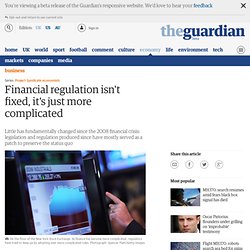
The short answer is no. Yes, the chances of an immediate repeat of the acute financial meltdown of 2008 are much reduced by the fact that most investors, regulators, consumers, and even politicians will remember their financial near-death experience for quite some time. As a result, it could take a while for recklessness to hit full throttle again. But, otherwise, little has fundamentally changed. Sorkin's Glass-Steagall straw man. Breaking the Banks. The following expresses my personal views, not those of the SEC or its staff.
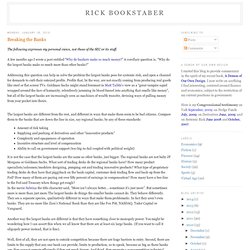
A few months ago I wrote a post entitled “Why do bankers make so much money?” A corollary question is, “Why do the largest banks make so much more than other banks?” Addressing this question can help us solve the problem the largest banks pose for systemic risk, and open a channel for demands to curb their outsized profits. Profits that, by the way, are not exactly coming from producing real goods like steel or flat screen TVs.
Credit Default Swaps (CDS) Are Insurance Products, Not Tradeable Assets. Our story thus far: The Commodity Futures Modernization Act of 2000, sponsored by Texas Senator Phil Gramm as a favor to his wife Wendy (who sat on the Board of Directors of Enron, which wanted to trade energy derivatives without oversight) was rushed through Congress in 2000.

Unread by Congress or their staffers, it was signed into law by President Bill Clinton on the advice of his Treasury Secretary Lawrence Summers. The CFMA radically deregulated derivatives. The law changed the Commodity Exchange Act of 1936 (CEA) to exempt derivatives transactions from regulations as either “futures” (under the CEA) or “securities” under federal securities laws. Further, the CFMA specifically exempted Credit Defaults Swaps and other derivative products from regulation by any State Insurance Board or Regulators. Shadow Banking and Financial Regulation. Editor’s Note:Morgan Ricks is a visiting assistant professor at Harvard Law School.
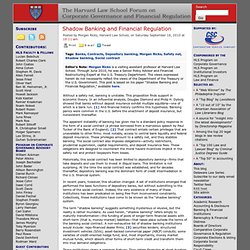
Through June 2010, he was a Senior Policy Advisor and Financial Restructuring Expert at the U.S. Treasury Department. The views expressed herein do not necessarily reflect the views of the Department of the Treasury or the U.S. Government. This post is based on his paper “Shadow Banking and Financial Regulation,” available here. Without a safety net, banking is unstable.
Basel III. Addressing "Systemic Risk" Global Standards & Regulation. Elizabeth Warren for Democracy Journal: Unsafe at Any Rate. Issue #5, Summer 2007 If it’s good enough for microwaves, it’s good enough for mortgages.
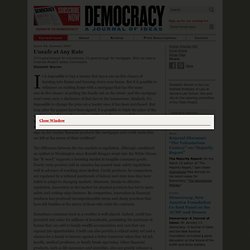
Why we need a Financial Product Safety Commission. Op-Ed Contributors - Jan. 4, 2009 - Wall Street’s Fatal Blind Spot. Fixing Wall Street: Reimagining - Not Just Repairing - Banking. Here's a curious fact.
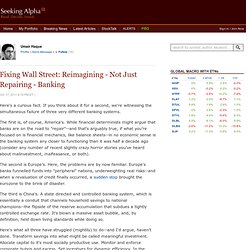
If you think about it for a second, we're witnessing the simultaneous failure of three very different banking systems. The first is, of course, America's. While financial determinists might argue that banks are on the road to "repair"--and that's arguably true, if what you're focused on is financial mechanics, like balance sheets--in no economic sense is the banking system any closer to functioning than it was half a decade ago (consider any number of recent slightly crazy horror stories you've heard about malinvestment, malfeasance, or both). Fixing Wall Street: Cutting The Gordian Knot. After reading about the protest on Wall Street with 700 arrests, I visited the website, and was disappointed that the movement has no formal agenda.
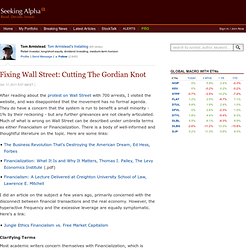
They do have a concern that the system is run to benefit a small minority - 1% by their reckoning - but any further grievances are not clearly articulated.